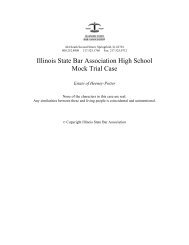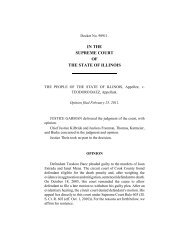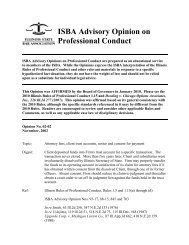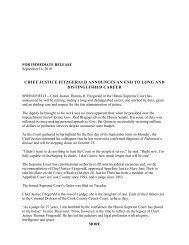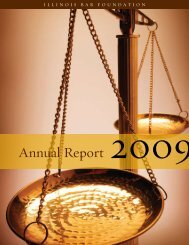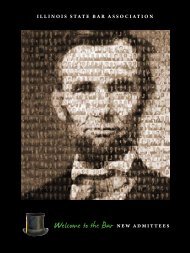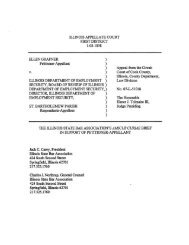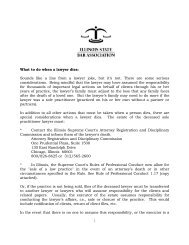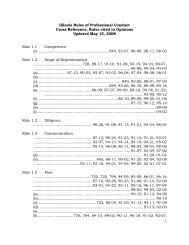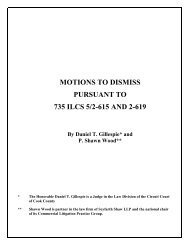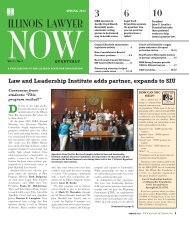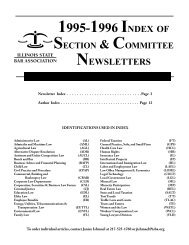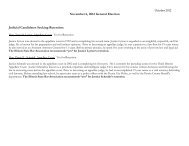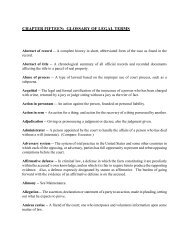ISBA Advisory Opinion on Professional Conduct - Illinois State Bar ...
ISBA Advisory Opinion on Professional Conduct - Illinois State Bar ...
ISBA Advisory Opinion on Professional Conduct - Illinois State Bar ...
Create successful ePaper yourself
Turn your PDF publications into a flip-book with our unique Google optimized e-Paper software.
<str<strong>on</strong>g>ISBA</str<strong>on</strong>g> <str<strong>on</strong>g>Advisory</str<strong>on</strong>g> <str<strong>on</strong>g>Opini<strong>on</strong></str<strong>on</strong>g> <strong>on</strong><br />
Professi<strong>on</strong>al C<strong>on</strong>duct<br />
<str<strong>on</strong>g>ISBA</str<strong>on</strong>g> <str<strong>on</strong>g>Advisory</str<strong>on</strong>g> <str<strong>on</strong>g>Opini<strong>on</strong></str<strong>on</strong>g>s <strong>on</strong> Professi<strong>on</strong>al C<strong>on</strong>duct are prepared as an educati<strong>on</strong>al service to<br />
members of the <str<strong>on</strong>g>ISBA</str<strong>on</strong>g>. While the <str<strong>on</strong>g>Opini<strong>on</strong></str<strong>on</strong>g>s express the <str<strong>on</strong>g>ISBA</str<strong>on</strong>g> interpretati<strong>on</strong> of the <strong>Illinois</strong><br />
Rules of Professi<strong>on</strong>al C<strong>on</strong>duct and other relevant materials in resp<strong>on</strong>se to a specific<br />
hypothesized fact situati<strong>on</strong>, they do not have the weight of law and should not be relied up<strong>on</strong><br />
as a substitute for individual legal advice.<br />
_________________________________________________________________________________<br />
<str<strong>on</strong>g>Opini<strong>on</strong></str<strong>on</strong>g> No. 11-02<br />
January 2011<br />
Topic:<br />
Digest :<br />
References:<br />
C<strong>on</strong>flict of Interest; Restricti<strong>on</strong>s <strong>on</strong> a Lawyer’s Practice<br />
A c<strong>on</strong>flict of interest would be created between Lawyer’s representati<strong>on</strong> of <strong>on</strong>e client<br />
and other similar clients if Lawyer were to sign a c<strong>on</strong>fidentiality agreement required by<br />
an accounting firm that would prohibit Lawyer from divulging a package of ideas<br />
developed by the accounting firm that would reduce the client’s tax obligati<strong>on</strong>s. For<br />
purposes of the <strong>Illinois</strong> Rules of Professi<strong>on</strong>al C<strong>on</strong>duct, a lawyer cannot agree to keep<br />
c<strong>on</strong>fidential interpretati<strong>on</strong>s of the law.<br />
<strong>Illinois</strong> Rules of Professi<strong>on</strong>al C<strong>on</strong>duct, Rules 1.7, 5.5, and 5.6 (b)<br />
ABA Formal <str<strong>on</strong>g>Opini<strong>on</strong></str<strong>on</strong>g> No. 93-371 (1993)<br />
ABA Formal <str<strong>on</strong>g>Opini<strong>on</strong></str<strong>on</strong>g> No. 00-417 (2000)<br />
Restatement Third, The Law Governing Lawyers, secti<strong>on</strong> 121 (2000)<br />
FACTS<br />
Accounting Firm tells Client A that Accounting Firm will disclose to Client A a package of ideas that<br />
can significantly reduce Client A’s taxes if: (1) Client A pays Accounting Firm a fee for the<br />
informati<strong>on</strong> and (2) Client A and Client A’s Lawyer each enter into a c<strong>on</strong>fidentiality agreement<br />
pursuant to which Client A and Lawyer agree to never divulge the ideas in the package.<br />
QUESTION<br />
If Lawyer signs the C<strong>on</strong>fidentiality Agreement, would Lawyer have a c<strong>on</strong>flict of interest in
epresenting Clients B, C, and D who could benefit from the ideas she has obtained from Accounting<br />
Firm but agreed not to disclose<br />
OPINION<br />
For purposes of this opini<strong>on</strong>, we will assume that the package of ideas (the “Informati<strong>on</strong>”) includes<br />
interpretati<strong>on</strong>s and applicati<strong>on</strong>s of the tax laws and regulati<strong>on</strong>s that would be useful to Lawyer in<br />
performing legal services for Clients B, C and D. Thus, we assume that <strong>on</strong>ce Lawyer has learned of<br />
the Informati<strong>on</strong>, she will be prohibited from applying ideas that would directly assist her representati<strong>on</strong><br />
of other clients.<br />
Based up<strong>on</strong> that assumpti<strong>on</strong>, if Lawyer were to sign the C<strong>on</strong>fidentiality Agreement, Lawyer would<br />
have a c<strong>on</strong>flict of interest in representing Clients B, C and D. Pursuant to <strong>Illinois</strong> Rule 1.7:<br />
(a) Except as provided in paragraph (b), a lawyer shall not represent a client if the<br />
representati<strong>on</strong> involves a c<strong>on</strong>current c<strong>on</strong>flict of interest. A c<strong>on</strong>current c<strong>on</strong>flict of interest<br />
exists if:<br />
(1) the representati<strong>on</strong> of <strong>on</strong>e client will be directly adverse to another client; or<br />
(2) there is a significant risk that the representati<strong>on</strong> of <strong>on</strong>e or more clients will be<br />
materially limited by the lawyer’s resp<strong>on</strong>sibilities to another client, a former client<br />
or a third pers<strong>on</strong> or by a pers<strong>on</strong>al interest of the lawyer.<br />
Similarly, secti<strong>on</strong> 121 of the Restatement, Third Editi<strong>on</strong>, provides that a c<strong>on</strong>flict of interest exists if<br />
“there is a substantial risk that the lawyer’s representati<strong>on</strong> of the client would be materially and<br />
adversely affected by the lawyer’s own interests or by the lawyer’s duties to another current client, a<br />
former client, or a third pers<strong>on</strong>.” As noted in the comment to the Restatement, the prohibiti<strong>on</strong> against<br />
c<strong>on</strong>flicts of interest “seeks to enhance the effectiveness of legal representati<strong>on</strong>. To the extent that a<br />
c<strong>on</strong>flict of interest undermines the independence of the lawyer’s professi<strong>on</strong>al judgment or inhibits a<br />
lawyer from working with appropriate vigor in the client’s behalf, the client’s expectati<strong>on</strong> of effective<br />
representati<strong>on</strong> could be compromised.” In the case at hand, the Lawyer’s own interests in h<strong>on</strong>oring the<br />
C<strong>on</strong>fidentiality Agreement would “materially limit” her resp<strong>on</strong>sibilities to Clients B, C and D because<br />
Lawyer would be prohibited from providing beneficial tax informati<strong>on</strong> to Clients B, C and D.<br />
Rule 1.7(b) does permit a lawyer to represent a client in a c<strong>on</strong>flict situati<strong>on</strong> if certain c<strong>on</strong>diti<strong>on</strong>s are<br />
met: (1) the lawyer reas<strong>on</strong>ably believes that the lawyer will be able to provide competent and diligent<br />
representati<strong>on</strong> to each affected client; (2) the representati<strong>on</strong> is not prohibited by law; (3) the<br />
representati<strong>on</strong> does not involve the asserti<strong>on</strong> of a claim by <strong>on</strong>e client against another client represented<br />
by the lawyer in the same litigati<strong>on</strong> or other proceeding before a tribunal; and (4) each affected client<br />
gives informed c<strong>on</strong>sent. As for the first c<strong>on</strong>diti<strong>on</strong>, it does not appear that Lawyer could reas<strong>on</strong>ably<br />
assume that withholding material tax strategies would not adversely affect Clients B, C, and D. The<br />
lawyer could not provide competent and diligent representati<strong>on</strong> to each affected client. With regard to<br />
the fourth c<strong>on</strong>diti<strong>on</strong> in Rule 1.7 (b), it is highly unlikely that Clients B, C and D would ever c<strong>on</strong>sent to<br />
Lawyer withholding informati<strong>on</strong> from them <strong>on</strong>ce Clients B, C and D were informed that such<br />
informati<strong>on</strong> might save them significant tax dollars. In short, it does not appear that Lawyer could<br />
overcome the c<strong>on</strong>flict. Thus, for the purposes of the <strong>Illinois</strong> Rules of Professi<strong>on</strong>al C<strong>on</strong>duct, a lawyer<br />
2
cannot agree to keep c<strong>on</strong>fidential interpretati<strong>on</strong>s of the law.<br />
This situati<strong>on</strong> is distinguishable from <strong>on</strong>e in which a lawyer agrees to keep c<strong>on</strong>fidential certain<br />
proprietary informati<strong>on</strong> such as manufacturing processes that may be disclosed to a lawyer while<br />
c<strong>on</strong>ducting a due diligence investigati<strong>on</strong> of a third party corporati<strong>on</strong>. In such a case, the industryrelated<br />
proprietary informati<strong>on</strong> might be beneficial to other clients whom the lawyer represents in the<br />
same industry. This c<strong>on</strong>fidential informati<strong>on</strong> would not, however, be useful to the lawyer in<br />
performing legal services. Therefore, despite her c<strong>on</strong>fidentiality pledge, the lawyer could generally<br />
c<strong>on</strong>tinue to represent other clients in the same industry because the lawyer’s inability to use the<br />
industry-related proprietary informati<strong>on</strong> would not impede the lawyer’s ability to perform legal<br />
services for those clients.<br />
Two other issues are presented if Lawyer were to agree to keep the Accounting Firm’s tax plan<br />
c<strong>on</strong>fidential. The first issue is whether the Lawyer’s agreement not to divulge useful informati<strong>on</strong> to<br />
other clients c<strong>on</strong>stitutes an impermissible restricti<strong>on</strong> <strong>on</strong> Lawyer’s right to practice under Rule 5.6. Rule<br />
5.6 provides that:<br />
A lawyer shall not participate in offering or making:<br />
(a) a partnership, shareholders, operating, employment, or other similar type of agreement that<br />
restricts the rights of a lawyer to practice after terminati<strong>on</strong> of a relati<strong>on</strong>ship, except an<br />
agreement c<strong>on</strong>cerning benefits up<strong>on</strong> retirement; or<br />
(b) an agreement in which a restricti<strong>on</strong> <strong>on</strong> the lawyer’s right to practice is part of the settlement<br />
of a client c<strong>on</strong>troversy.<br />
The C<strong>on</strong>fidentiality Agreement to be signed by Lawyer does not fall squarely within Rule 5.6 because<br />
it is not part of a partnership or employment agreement pursuant to 5.6(a), nor is it “part of the<br />
settlement of a client c<strong>on</strong>troversy,” under Rule 5.6(b). N<strong>on</strong>etheless, the restricti<strong>on</strong>s placed <strong>on</strong><br />
Lawyer’s ability to represent other clients similar to Client A in the future without facing a c<strong>on</strong>flict of<br />
interest may go to the spirit of Rule 5.6.<br />
ABA Formal <str<strong>on</strong>g>Opini<strong>on</strong></str<strong>on</strong>g> No. 93-371 cited three reas<strong>on</strong>s for Rule 5.6(b):<br />
First, permitting such agreements restricts the access of the public to lawyers, who, by virtue of<br />
their background and experience, might be the very best available talent to represent these<br />
individuals….Sec<strong>on</strong>d, the use of such agreements may provide clients with rewards that bear<br />
less relati<strong>on</strong>ship to the merits of their claims than they do to the desire of the defendant to “buy<br />
off” plaintiff’s counsel. Third, the offering of such restrictive agreements places the plaintiff’s<br />
lawyer in a situati<strong>on</strong> where there is c<strong>on</strong>flict between the interests of present clients and those of<br />
future clients.<br />
The third reas<strong>on</strong> applies in the situati<strong>on</strong> at hand. The terms of the C<strong>on</strong>fidentiality Agreement would<br />
create a c<strong>on</strong>flict between the interest of Lawyer’s current Client A and those of future clients who<br />
3
could benefit from the knowledge gained by Lawyer from Accounting Firm.<br />
ABA Formal <str<strong>on</strong>g>Opini<strong>on</strong></str<strong>on</strong>g> No. 00-417 also looked at Rule 5.6(b) in determining whether, under the ABA<br />
Model Rules of Professi<strong>on</strong>al C<strong>on</strong>duct, “a lawyer representing a party in a c<strong>on</strong>troversy may agree to a<br />
proposal by opposing counsel that settlement of the matter be c<strong>on</strong>diti<strong>on</strong>ed <strong>on</strong> the lawyer not using any<br />
of the informati<strong>on</strong> learned during the current representati<strong>on</strong> in any future representati<strong>on</strong> against the<br />
same opposing party.” The <str<strong>on</strong>g>Opini<strong>on</strong></str<strong>on</strong>g> c<strong>on</strong>cluded that such an agreement not to use informati<strong>on</strong> learned in<br />
the representati<strong>on</strong> would effectively restrict the lawyer’s right to practice in violati<strong>on</strong> of Rule 5.6 (b).<br />
A final issue raised by Lawyer’s promise to hold Accounting Firm’s tax advice c<strong>on</strong>fidential is<br />
whether Lawyer’s acti<strong>on</strong>s could be c<strong>on</strong>sidered assisting Accounting Firm in the unauthorized<br />
practice of law. Pursuant to <strong>Illinois</strong> Rule 5.5(a), a lawyer shall not practice law in a jurisdicti<strong>on</strong> in<br />
violati<strong>on</strong> of the regulati<strong>on</strong> of the legal professi<strong>on</strong> in that jurisdicti<strong>on</strong>, or assist another in doing so.<br />
As noted in Comment (2) to Rule 5.5, limiting the practice of law to members of the bar protects the<br />
public against renditi<strong>on</strong> of legal services by unqualified pers<strong>on</strong>s. We have assumed that the tax<br />
package to be disclosed by Accounting Firm to Client A c<strong>on</strong>tains legal advice or analysis.<br />
Although the services performed by accountants and lawyers do overlap in some areas, there is a<br />
line that can be crossed at some point at which the accountant’s services may become the “practice<br />
of law.”’ Unauthorized practice of law questi<strong>on</strong>s are very fact specific and therefore no opini<strong>on</strong> can<br />
be stated <strong>on</strong> that issue given the general facts presented in the inquiry.<br />
4



